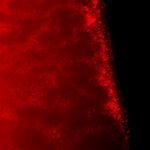Lien vers Pubmed [PMID] – 14764595
J. Biol. Chem. 2004 Apr;279(18):18767-75
In smoker’s brain, rodent brain, and in cultured cells expressing nicotinic receptors, chronic nicotine treatment induces an increase in the total number of high affinity receptors for acetylcholine and nicotine, a process referred to as up-regulation. Up-regulation induced by 1 mm nicotine reaches 6-fold for alpha3beta2 nicotinic receptors transiently expressed in HEK 293 cells, whereas it is much smaller for alpha3beta4 receptors, offering a rationale to investigate the molecular mechanism underlying up-regulation. In this expression system binding sites are mainly intracellular, as shown by [(3)H]epibatidine binding experiments and competition with the impermeant ligand carbamylcholine. Systematic analysis of beta2/beta4 chimeras demonstrates the following. (i) The extracellular domain critically contributes to up-regulation. (ii) Only residues belonging to two beta2 segments, 74-89 and 106-115, confer up-regulation to beta4, mainly by decreasing the amount of binding sites in the absence of nicotine; on an atomic three-dimensional model of the alpha3beta2 receptor these amino acids form a compact microdomain that mainly contributes to the subunit interface and also faces the acetylcholine binding site. (iii) The beta4 microdomain is sufficient to confer to beta2 a beta4-like up-regulation. (iv) This microdomain makes an equivalent contribution to the up-regulation differences between alpha4beta2 and alpha4beta4. We propose that nicotine, by binding to immature oligomers, elicits a conformational reorganization of the microdomain, strengthening the interaction between adjacent subunits and, thus, facilitating maturation processes toward high affinity receptors. This mechanism may be central to nicotine addiction, since alpha4beta2 is the subtype exhibiting the highest degree of up-regulation in the brain.



